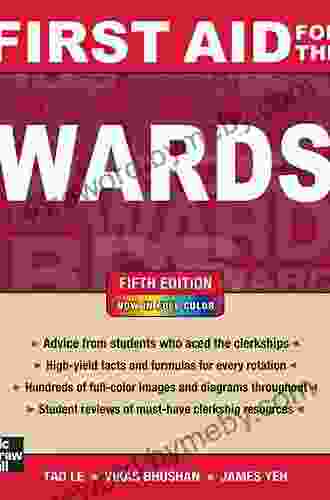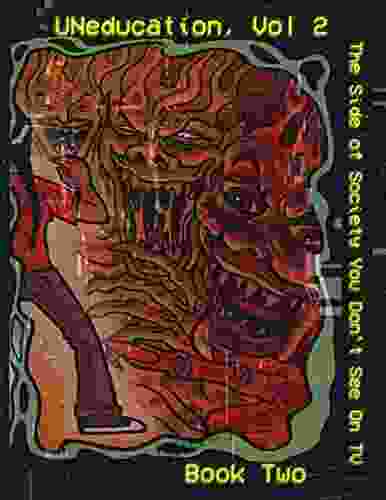The Side of Society You Don't See on TV: Uneducation


4.7 out of 5
| Language | : | English |
| File size | : | 66638 KB |
| Screen Reader | : | Supported |
| Print length | : | 117 pages |
| Lending | : | Enabled |
In the United States, we like to believe that everyone has an equal opportunity to succeed. We tell ourselves that if you work hard and play by the rules, you can achieve anything you set your mind to. But the reality is that for many Americans, the deck is stacked against them from the very beginning.
One of the most insidious forms of inequality in our society is educational inequality. Uneducated Americans are more likely to live in poverty, to be unemployed, and to have health problems. They are also less likely to vote, to participate in civic activities, and to make healthy choices for themselves and their families.
The problem of uneducated Americans is a silent epidemic. It's not something that we talk about very much, and it's not something that we see on TV. But it's a problem that affects millions of people, and it's a problem that we need to address.
The Causes of Uneducation
There are many factors that contribute to educational inequality in America. Some of the most important factors include:
- Poverty: Children who grow up in poverty are much less likely to succeed in school than children who grow up in affluent families. This is due to a number of factors, including lack of access to quality early childhood education, inadequate nutrition, and exposure to violence and other stressors.
- Race and ethnicity: Children of color are more likely to grow up in poverty than white children, and they are also more likely to attend underfunded schools. This is due to a long history of discrimination in housing, education, and other areas.
- Disability: Students with disabilities are more likely to drop out of school than students without disabilities. This is due to a number of factors, including lack of access to appropriate supports and services, and discrimination.
The Consequences of Uneducation
The consequences of uneducated Americans are devastating. Uneducated Americans are more likely to:
- Live in poverty: Uneducated Americans are more likely to be unemployed or underemployed, and they are more likely to live in poverty. This is because they lack the skills and knowledge needed to succeed in today's economy.
- Be unemployed: Uneducated Americans are more likely to be unemployed than educated Americans. This is because they lack the skills and knowledge needed to compete for jobs.
- Have health problems: Uneducated Americans are more likely to have health problems than educated Americans. This is because they are more likely to smoke, drink alcohol, and eat unhealthy foods.
- Be involved in crime: Uneducated Americans are more likely to be involved in crime than educated Americans. This is because they are more likely to be poor and unemployed, and they are more likely to have access to guns.
- Not vote: Uneducated Americans are less likely to vote than educated Americans. This is because they are less likely to be engaged in the political process.
- Not participate in civic activities: Uneducated Americans are less likely to participate in civic activities than educated Americans. This is because they are less likely to have the skills and knowledge needed to participate.
- Make unhealthy choices: Uneducated Americans are more likely to make unhealthy choices for themselves and their families. This is because they are less likely to have the knowledge and skills needed to make healthy choices.
The Solutions
There are a number of things that we can do to address the problem of uneducated Americans. Some of the most important solutions include:
- Investing in early childhood education: Research has shown that investing in early childhood education is one of the most effective ways to prevent educational inequality. This is because early childhood education provides children with the skills and knowledge they need to succeed in school and life.
- Providing more resources to schools in low-income communities: Schools in low-income communities often lack the resources they need to provide their students with a quality education. This includes things like qualified teachers, up-to-date textbooks, and safe and well-maintained facilities.
- Addressing the needs of students with disabilities: Students with disabilities need special education services in Free Download to succeed in school. These services can include things like speech therapy, occupational therapy, and physical therapy.
- Ending discrimination in housing, education, and other areas: Discrimination is a major factor in educational inequality. We need to end discrimination in all its forms in Free Download to create a more just and equitable society.
The problem of uneducated Americans is a serious one, but it is one that we can solve. By investing in early childhood education, providing more resources to schools in low-income communities, addressing the needs of students with disabilities, and ending discrimination, we can create a more just and equitable society for all.
4.7 out of 5
| Language | : | English |
| File size | : | 66638 KB |
| Screen Reader | : | Supported |
| Print length | : | 117 pages |
| Lending | : | Enabled |
Do you want to contribute by writing guest posts on this blog?
Please contact us and send us a resume of previous articles that you have written.
 Book
Book Novel
Novel Page
Page Chapter
Chapter Text
Text Story
Story Genre
Genre Reader
Reader Library
Library Paperback
Paperback E-book
E-book Magazine
Magazine Newspaper
Newspaper Paragraph
Paragraph Sentence
Sentence Bookmark
Bookmark Shelf
Shelf Glossary
Glossary Bibliography
Bibliography Foreword
Foreword Preface
Preface Synopsis
Synopsis Annotation
Annotation Footnote
Footnote Manuscript
Manuscript Scroll
Scroll Codex
Codex Tome
Tome Bestseller
Bestseller Classics
Classics Library card
Library card Narrative
Narrative Biography
Biography Autobiography
Autobiography Memoir
Memoir Reference
Reference Encyclopedia
Encyclopedia Jesse Braun
Jesse Braun Frank Thomas Smith
Frank Thomas Smith Fatime Losonci
Fatime Losonci Evan S Connell
Evan S Connell Franya J Berkman
Franya J Berkman Erica M Nielsen
Erica M Nielsen Robert Jensen
Robert Jensen Hudson Talbott
Hudson Talbott Frederick Grinnell
Frederick Grinnell Linda Dobson
Linda Dobson Fatima Bhutto
Fatima Bhutto Esther Crain
Esther Crain Mandy Fason
Mandy Fason Jen Beck Seymour
Jen Beck Seymour Frank Gado
Frank Gado Peter Hopkirk
Peter Hopkirk Laurence Anholt
Laurence Anholt Ethan Bueno De Mesquita
Ethan Bueno De Mesquita Explorer Publishing
Explorer Publishing Erin Eileen Leigh
Erin Eileen Leigh
Light bulbAdvertise smarter! Our strategic ad space ensures maximum exposure. Reserve your spot today!

 Ibrahim BlairFirst Aid for the Wards: The Ultimate Guide to Emergency Care in the Hospital...
Ibrahim BlairFirst Aid for the Wards: The Ultimate Guide to Emergency Care in the Hospital...
 Terence NelsonMaximize Your Performance: Your Nutrition Action Plan for Greater Endurance...
Terence NelsonMaximize Your Performance: Your Nutrition Action Plan for Greater Endurance... Geoffrey BlairFollow ·18.7k
Geoffrey BlairFollow ·18.7k Jeffrey CoxFollow ·17.8k
Jeffrey CoxFollow ·17.8k Herman MelvilleFollow ·11.8k
Herman MelvilleFollow ·11.8k Reed MitchellFollow ·3.4k
Reed MitchellFollow ·3.4k Jarrett BlairFollow ·9.6k
Jarrett BlairFollow ·9.6k Samuel Taylor ColeridgeFollow ·14.3k
Samuel Taylor ColeridgeFollow ·14.3k Andy ColeFollow ·13.7k
Andy ColeFollow ·13.7k Robert FrostFollow ·11.7k
Robert FrostFollow ·11.7k

 Al Foster
Al FosterDive into the Enchanting World of Manatees: An...
Unveiling the Secrets of the Gentle...

 Isaac Mitchell
Isaac MitchellThe Farm Reggie and Friends: US Version - A Captivating...
A Heartwarming Tale that Embraces...

 Esteban Cox
Esteban CoxThe Interior Design Handbook: Your Comprehensive Guide to...
Are you ready to...

 William Wordsworth
William WordsworthFall Head Over Heels for "Esio Trot" by Roald Dahl: A...
Prepare to be charmed, amused, and utterly...

 Caleb Carter
Caleb CarterBlack Clover Vol Light Frida Ramstedt: A Thrilling...
Prepare to be spellbound by...

 Richard Simmons
Richard SimmonsFantastic Mr. Fox: A Literary Adventure That Captivates...
In the realm...
4.7 out of 5
| Language | : | English |
| File size | : | 66638 KB |
| Screen Reader | : | Supported |
| Print length | : | 117 pages |
| Lending | : | Enabled |








